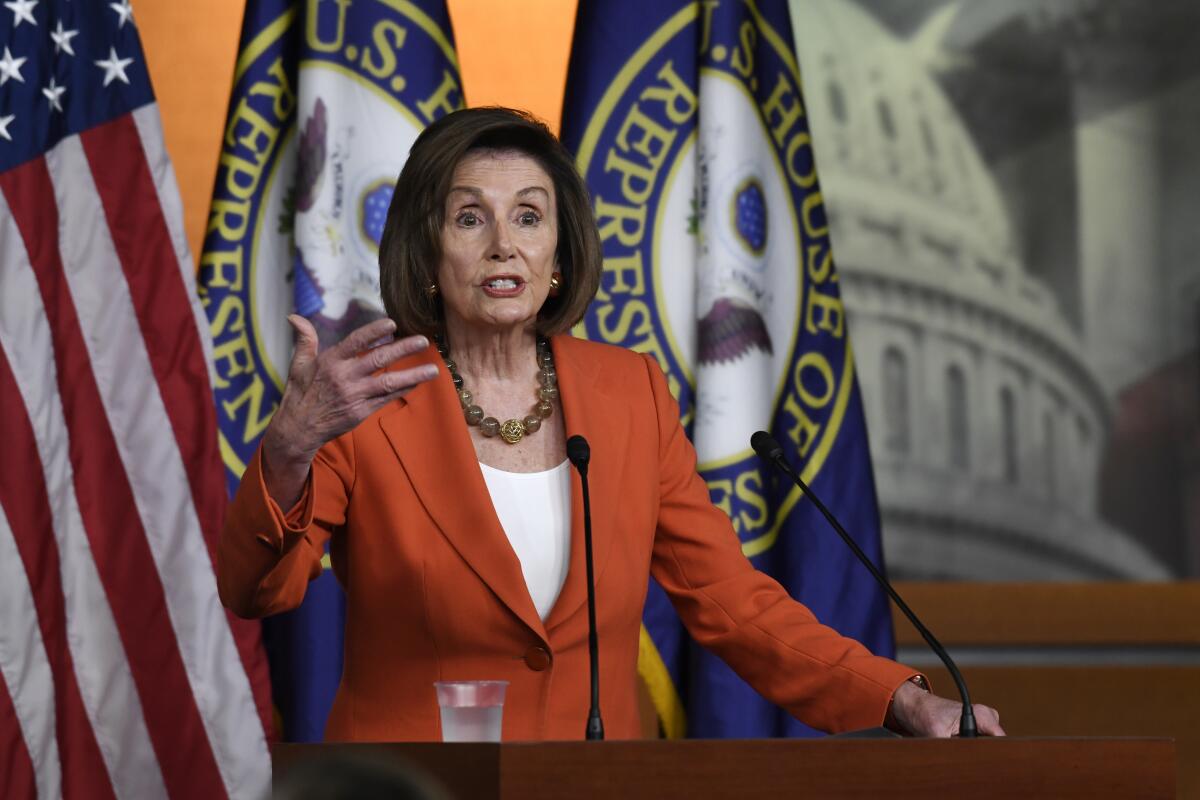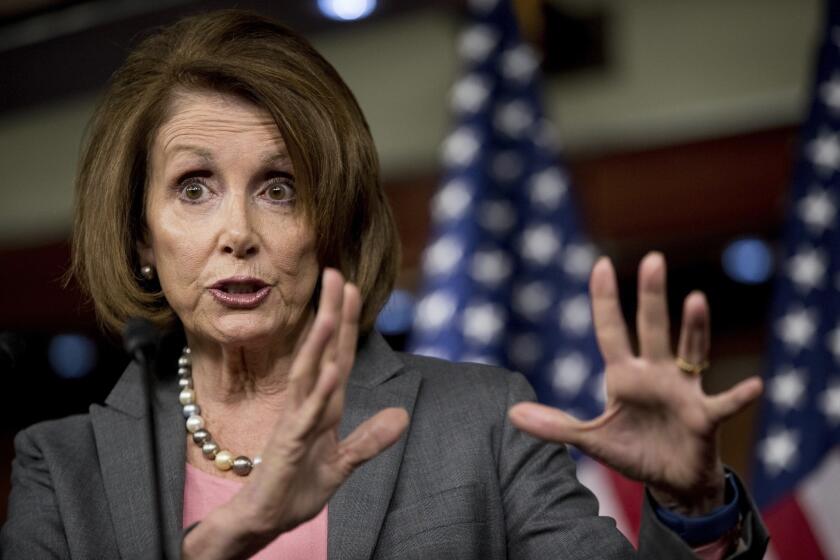Column: For Nancy Pelosi, maybe one last chance to do something really, really big

- Share via
As a San Francisco resident, Nancy Pelosi knows a few things about earthquakes.
So in 2010 when Republicans won the Massachusetts Senate seat once held by Edward M. Kennedy, an upset high on the political Richter scale, it was Pelosi — cool, calm, collected — who sought to steady Democrats and put some starch in their spines.
The loss was widely seen as a referendum on the party’s tortured effort to enact the Affordable Care Act, the signature item on President Obama’s agenda. Many were ready to give up on the far-reaching healthcare law. But Pelosi, then in her first stint as House speaker, insisted capitulation was not an option.
“We will move on many fronts,” Pelosi told reporters. “We will go through the gate. If the gate is closed, we will go over the fence. If the fence is too high, we will pole-vault in. If that doesn’t work, we will parachute in. But we are going to get healthcare reform passed.”
Democrats did so, at no small price. The political trench warfare helped cost the party control of the House and exiled Pelosi from the speakership until her return nearly a decade later.
Now, in what may be the last of her 17 terms, Pelosi is again trying to crowbar a monumental package of legislation through Congress. It may be even tougher this time around.
Progressives threaten to block Biden’s infrastructure plan as negotiations around the broader social spending plan stall.
A decade ago, when the Affordable Care Act passed on a party-line vote, Democrats enjoyed a 79-seat margin in the House. Today, as they struggle to enact the signature item on President Biden’s agenda, a pair of multitrillion-dollar infrastructure bills, the party holds a margin of just eight seats.
Still, few are betting against Pelosi, assuming Biden can reach agreement with the two balky Democrats — Sens. Kyrsten Sinema of Arizona and Joe Manchin III of West Virginia — standing athwart his efforts.
“She has an ability to get votes when it’s just extraordinarily difficult,” said Norman Ornstein, a resident scholar at the American Enterprise Institute and decades-long student of Congress.
“The debate tests the limits of her skill, but I would not count her out until the final roll call,” agreed Cindy Simon Rosenthal, an emeritus political science professor at the University of Oklahoma who co-wrote a book on Pelosi’s rise to the speakership.
One key to her success is unflagging determination: jump the fence, pole-vault, parachute.
Another less-understood aspect is Pelosi’s pragmatism. Lost in the caricature of a loopy left-winger from wacky San Francisco is the fact she has never been an ideologue, or one willing to sacrifice the attainable in pursuit of some greater, more idealized goal.
“That’s part of leadership,” said John Burton, a friend of Pelosi for more than 50 years, who served as leader of Democrats in California’s Senate. “You try to get as much as you can for as many as you can and then live to fight another day.”
That’s why Pelosi is widely regarded as one of the most effective speakers in history, with a list of achievements that includes not just the Affordable Care Act but twice helping rescue the country from economic collapse, first in 2009 amid the Great Recession and again last year after the worldwide shutdown caused by the COVID-19 pandemic.
No less an authority than Newt Gingrich has suggested Pelosi may be “the strongest speaker in history.”
“She has shown more capacity to organize and muscle, with really narrow margins,” Gingrich, a Republican who held the job from 1995 through 1998, recently told Paul Kane of the Washington Post.
Pelosi has said passing Biden’s massive bricks-and-mortar infrastructure bill and his cradle-to-grave social spending package would be the “culmination of my career in Congress,” though she bristles at any suggestion she plans to depart anytime soon. “Get out of here,” she told reporters who broached the R (as in retirement) word.
But it’s Pelosi, 81, who’s put a time limit on her tenure, in a 2018 L.A. Times interview when she called herself “a transitional figure” with other goals in life, and then when she told fellow Democrats she would remain speaker for no more than four years — until after the 2022 midterm election.
Privately, several lawmakers have told The Times’ congressional correspondent, Jennifer Haberkorn, they believe these will be Pelosi’s last major pieces of legislation and thus will pass in some form, however tortured the process and whatever compromises it takes.
The House speaker isn’t going anywhere, yet. But that’s not stopping her would-be successors
When Pelosi ran for Congress the first time in 1987, her slogan was “a voice that will be heard.”
It was an effort to distinguish herself in a crowded Democratic field that included several candidates more vocally to her left, by suggesting Pelosi would not just be an advocate for the party or a liberal philosophy but would go to Washington and actually get things done.
She redeemed that promise long ago.
No speaker since Sam Rayburn — who held the position three separate times between 1940 and 1961 — “can claim a similar record of policy accomplishments and party cohesiveness,” said the University of Oklahoma’s Rosenthal. “In comparison with her contemporaries ... she is hands-down the most successful speaker of the modern era.”
Failing to pass the most ambitious and expansive Democratic agenda in ages, in what may be the twilight of her political career, would no doubt be a huge disappointment for Pelosi.
But even if she can’t corral the votes for one last big triumph, Pelosi’s voice will keep echoing for years and decades to come.
More to Read
Get the latest from Mark Z. Barabak
Focusing on politics out West, from the Golden Gate to the U.S. Capitol.
You may occasionally receive promotional content from the Los Angeles Times.











